Key takeaways:
- Resilience is the ability to bounce back from adversity, emphasizing adaptability, learning, and growth from setbacks.
- Building resilience leads to enhanced problem-solving, stronger relationships, improved mental health, increased confidence, and greater adaptability.
- Key personal resilience factors include strong support systems, self-awareness, and maintaining a positive mindset.
- Practical strategies to develop resilience include mindfulness practices, setting achievable goals, and embracing a growth mindset.
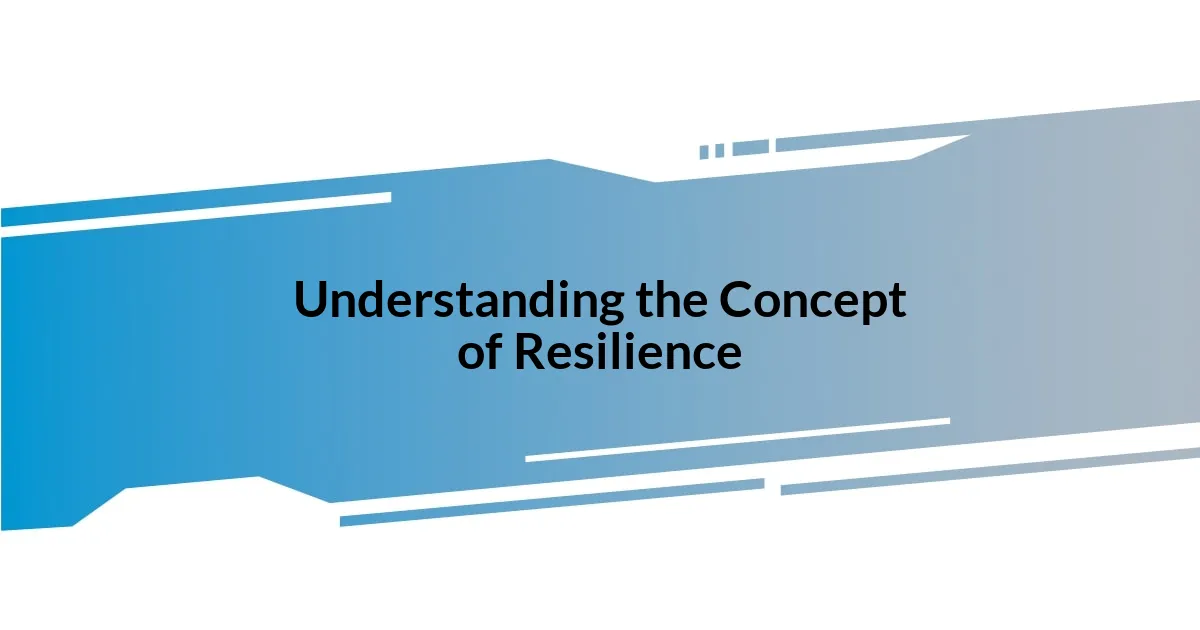
Understanding the Concept of Resilience
Resilience, at its core, is the ability to bounce back from adversity. Reflecting on my own experiences, I recall a time when I faced significant challenges in my career. Instead of feeling defeated, I harnessed those moments as opportunities for growth, reminding myself that setbacks often pave the way for new paths.
Have you ever experienced moments where life threw unexpected hurdles your way? I remember feeling overwhelmed during a personal crisis, but I discovered that resilience isn’t just about toughness; it’s also about vulnerability. It’s in those raw moments that we often find our strength.
Much like a rubber band that stretches and returns to its original form, resilience allows us to adapt and recover from life’s curveballs. I’ve learned that it’s not merely about enduring difficulties but also about learning from them. Each tough experience adds a layer to our resilience, sculpting us into who we are today.
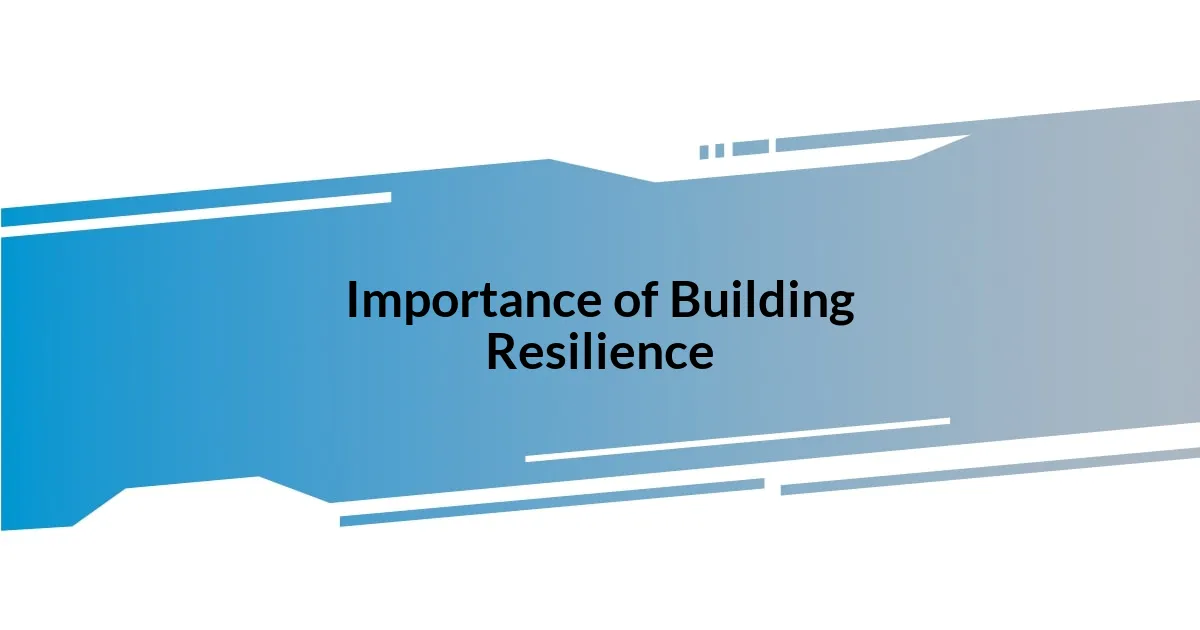
Importance of Building Resilience
Building resilience is crucial because it equips us with the tools to handle life’s inevitable challenges. I remember a phase in my life when I faced layoffs during a tough economic period. Instead of letting fear consume me, I leaned into my adaptability, learning new skills while networking. This journey taught me that resilience doesn’t just foster survival; it nurtures growth and transformation.
Here are some key reasons why cultivating resilience is essential:
- Enhanced Problem-Solving: Resilient individuals are more adept at finding solutions during stressful times.
- Stronger Relationships: Building resilience can improve our ability to communicate and connect with others, fostering deeper bonds.
- Improved Mental Health: Developing resilience often leads to lower levels of anxiety and depression, as it promotes a more positive outlook on life.
- Increased Confidence: Each time we overcome adversity, we boost our self-esteem and reinforce our belief in our capabilities.
- Greater Adaptability: Resilience helps us adjust to change and uncertainty, making transitions seem less daunting.
Having experienced life’s ups and downs, I can wholeheartedly say that every struggle I’ve faced has made me more adaptable. It highlights how resilience is not just a personal strength; it’s a vital part of our journey through life.
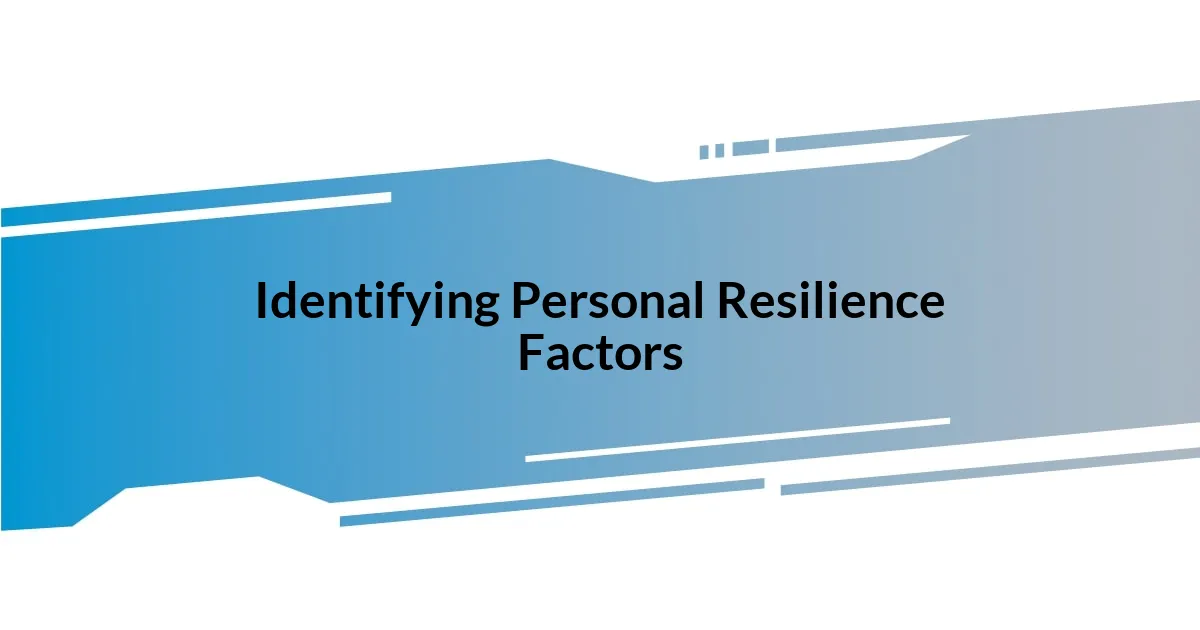
Identifying Personal Resilience Factors
When identifying personal resilience factors, I often reflect on my support systems. Having a network of friends and family who provide encouragement and understanding has made a world of difference in tough times. I recall a particularly stressful period when my friends rallied around me, reminding me that I wasn’t alone, which rekindled my determination to push through challenges.
Another factor worth considering is self-awareness. It’s about recognizing my strengths and weaknesses. The last time I encountered a significant setback, I took the time to evaluate my coping mechanisms. I found that my inclination to journal my thoughts helped me process emotions, preventing them from overwhelming me. Recognizing this ability became a cornerstone of my resilience, empowering me each time I faced hurdles.
Lastly, I’ve discovered that maintaining a positive mindset plays a crucial role in resilience. I remember a time when, after experiencing failure in a personal project, I decided to reframe it as a learning opportunity. This shift in perspective transformed my experience, reinforcing that even in tough situations, I could find silver linings. It’s this blend of support, self-awareness, and positivity that together enhance my overall resilience.
| Factor | Description |
|---|---|
| Support Systems | A strong network of friends and family that offers encouragement during tough times. |
| Self-Awareness | Understanding one’s strengths and weaknesses to effectively cope with challenges. |
| Positive Mindset | Reframing negative experiences as learning opportunities to foster growth. |
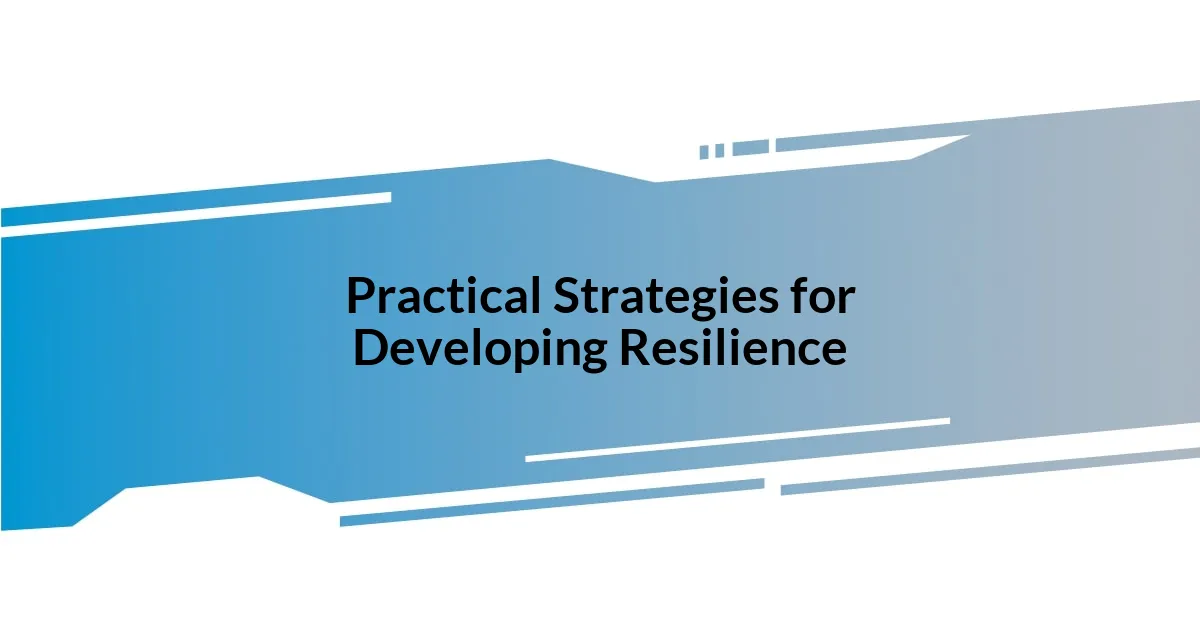
Practical Strategies for Developing Resilience
One practical strategy for developing resilience is fostering a daily mindfulness practice. I remember when I first incorporated meditation into my routine after a particularly stressful year. Those quiet moments helped me regroup and center my thoughts, allowing me to approach challenges with a clearer, more composed mindset. It’s incredible how just a few minutes of mindfulness can create space for reflection and boost emotional regulation during turbulent times.
Another effective approach is setting achievable goals. I often find that breaking down larger tasks into smaller, manageable steps can significantly reduce feelings of overwhelm. For instance, when I decided to take on a big project at work, I mapped out weekly objectives. Each small success along the way felt like a personal victory, which not only contributed to my resilience but also ignited my motivation to keep pushing forward. Have you ever experienced that sense of accomplishment when you tackle something piece by piece?
Additionally, embracing a growth mindset is vital. I came across a challenging situation in my career where I received critical feedback about a presentation. Instead of feeling defeated, I chose to see it as an opportunity to learn and improve. This mindset shift sparked a desire to develop my presentation skills further, and I even sought out workshops to enhance my abilities. I ask you, what opportunities for growth have you discovered in moments of adversity? Each setback can be a stepping stone if we allow ourselves to grow from it.
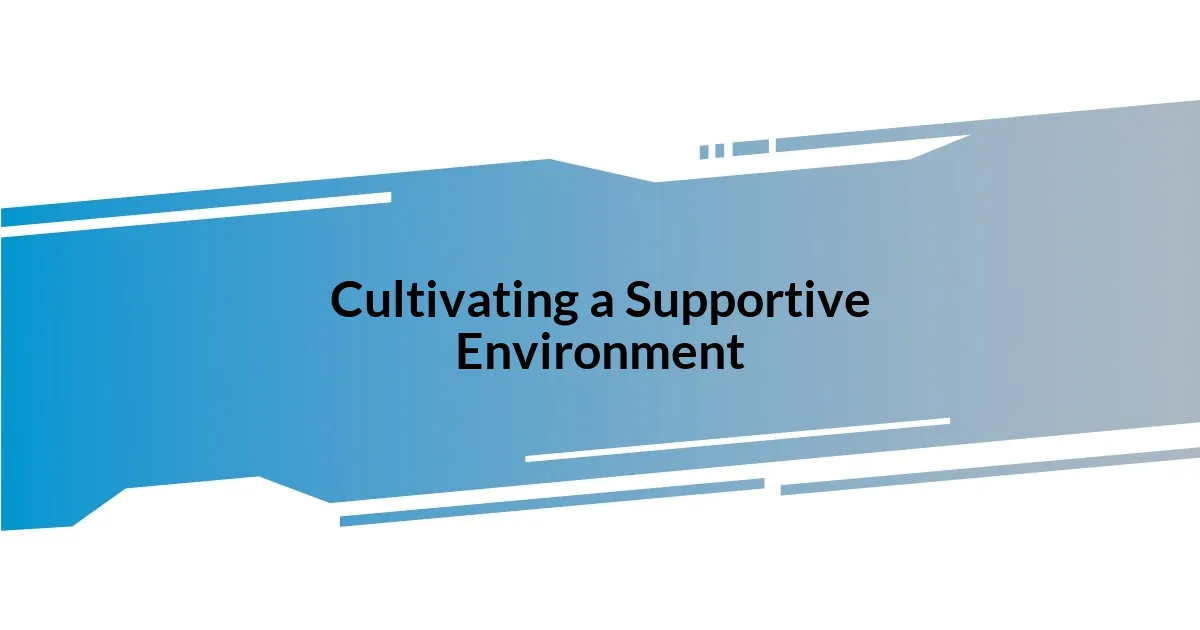
Cultivating a Supportive Environment
Creating a supportive environment is crucial for resilience. I remember moving to a new city where I didn’t know anyone. It felt daunting at first, but I made it a point to seek community. Volunteering at local events helped me connect with like-minded individuals, and slowly, I formed friendships that offered emotional support during both good and tough times. Have you ever found comfort in unexpected connections?
It’s also essential to nurture open communication within your support circle. I learned this firsthand when, after feeling overwhelmed with work and life, I shared my feelings with close friends. Their willingness to listen and offer advice made me realize how vital it is to express vulnerabilities. By promoting a space where we can share honestly, we encourage mutual understanding, allowing everyone to feel valued and supported.
Lastly, encouraging others in your network strengthens everyone’s resilience. When a friend faced a setback, I made it my mission to remind her of her strengths. Celebrating even the smallest achievements fosters a sense of belonging and can uplift spirits significantly. In what ways do you support your friends and family to help them build their resilience? By investing time in each other’s growth, we create a rich tapestry of support that can weather any storm.
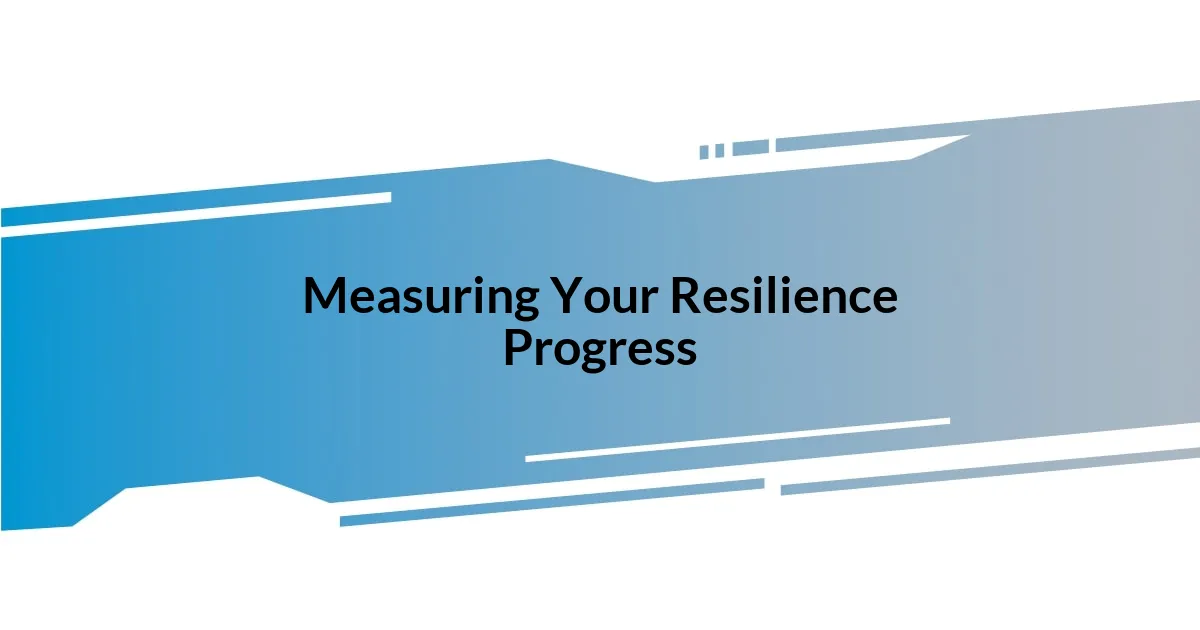
Measuring Your Resilience Progress
Tracking your resilience progress can be eye-opening. Initially, I jotted down my emotional reactions to everyday challenges. Over time, I noticed patterns—certain situations triggered stronger emotional responses than others. This reflective practice helped me identify areas for improvement and celebrate my growth. Have you ever paused to notice your emotional responses? It’s fascinating how self-awareness can reshape our approach to adversity.
Another method I’ve found useful is maintaining a resilience journal. Each week, I would write about challenges I faced and how I handled them. Initially, it felt like a chore, but as I read back through entries, I was struck by how far I had come. Some entries highlighted setbacks that I eventually transformed into successes. How often do we take the time to acknowledge our victories, no matter how small? Realizing my progress motivated me to keep pushing forward.
Lastly, consider seeking feedback from trusted friends or mentors. I remember asking a colleague after a tough project how they perceived my handling of stress. Their insights helped me see strengths I hadn’t recognized, like my ability to remain calm under pressure. This external perspective illuminated aspects of my resilience that I could work on enhancing further. Have you thought about how others view your resilience? Sometimes, their feedback can be a valuable tool for personal development.
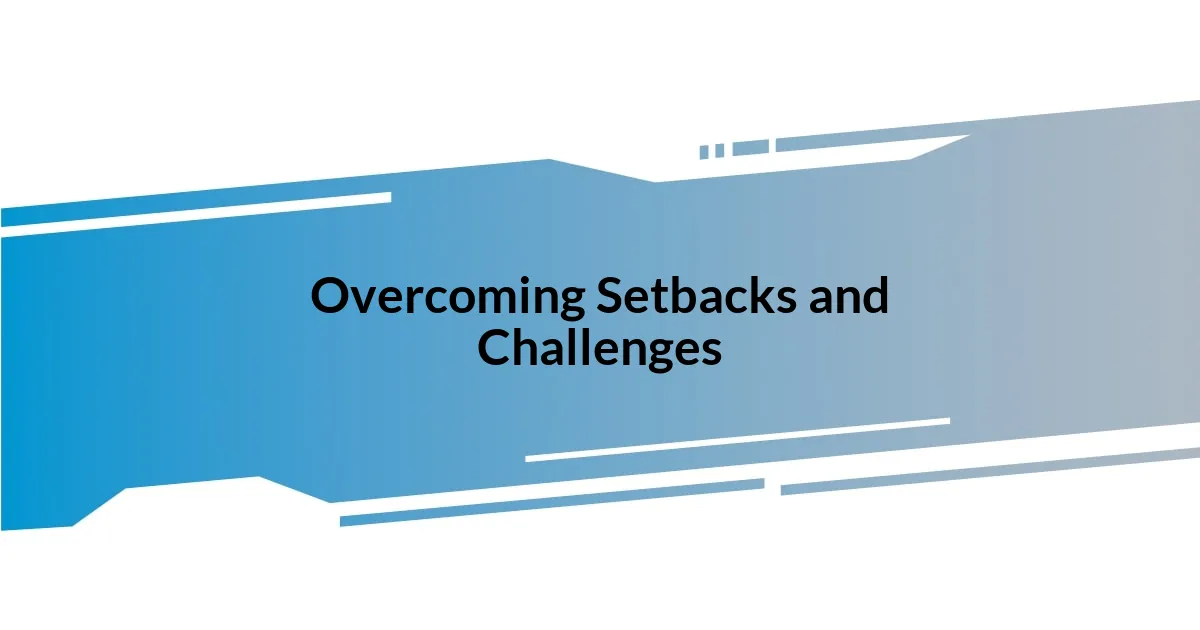
Overcoming Setbacks and Challenges
Facing setbacks and challenges is an inevitable part of life, and how we respond can define our path forward. I recall a time when I didn’t get selected for a project I had poured my heart into. Instead of sulking, I took it as a cue to reassess my approach. This experience taught me that failures can serve as powerful teachers if we choose to learn from them. Have you ever transformed a disappointment into a stepping stone for growth?
In my experience, a crucial factor in overcoming challenges is maintaining a positive mindset. After losing a significant client, I felt defeated, caught in a whirlwind of self-doubt. However, I decided to focus on what I could control—my work ethic and relationships. The next few weeks involved reaching out to potential partners and brainstorming ways to diversify my projects. This proactive attitude not only helped me regain momentum but also ignited a burst of creativity. What strategies do you use to stay focused when the going gets tough?
Each challenge presents an opportunity for growth, but it’s essential to know when to seek help. I recall struggling with burnout during a particularly demanding work project, feeling like I was carrying the weight of the world. A trusted mentor encouraged me to prioritize self-care and even delegated some tasks to my team. This not only alleviated my burden but unlocked new avenues for collaboration and support. Have you considered how sharing your load can lead to breakthroughs? Embracing collaboration often fosters resilience, turning individual struggles into shared victories.